Welcome to Sunday Spotlight. Today we feature Anna Jacobs, who has released two historical fiction novels earlier this year, A Stranger in Honeyfield – 2nd in the Honeyfield series, and Gifts For Our Time – 4th and final in the Rivenshaw series. Thanks for joining us Anna!
When did you start writing and what was the catalyst?
I’ve told myself stories all my life from when I was 2 and started ‘scribbling’ as a child of 10. I can only remember two days in my whole life when stories weren’t running round my brain. The doctor put me on some medication and the stories vanished. I stopped taking it immediately and the stories came back after two days. I started writing stories in French when I was a teacher and was given a childish rubbishy book to use with teenage lads. Imagine how they’d have played up at it. Instead I rewrote a Ray Bradbury short story into their level of French and would provide the next chapter every Friday if they had behaved. I got permission to use if from Bradbury and it was published by Edward Arnold UK in about 1970 and stayed in print for 20 years. I wrote other French textbooks, but when Georgette Heyer died in 1975, I started trying to write regency romances like hers because I loved them so. (I still think her best books are superior to Jane Austen’s works, eg. Friday’s Child.) Inevitably, I started to develop my own style of writing, but I did have two regency romances published. What fun they were to write! One of them (Persons of Rank) won a $10,000 prize in a major writing competition and was my first novel ever published. (Thank you, Georgette!) I also wrote and had several fantasy novels published as Shannah Jay (available only as ebooks now).
How many novels have you written and published?
My 78th novel was published in February 2017. I have to confess that I’m even more addicted to story telling than I was when I started and I usually write 3 novels a year.
How long on average does it take you to write a book?
When I started, it took me well over a year. Now, after so much practice, it takes me about 3-4 months.
How has being Australian AND a woman impacted on your writing and/or writing career?
I’m Australian now but I started off in Lancashire, England, and my first books were heavily influenced by that background. I was published as a writer of ‘Lancashire sagas’ and I had to get special permission from my English publisher to write my first Australian set novel for them. Now I write stories set in both countries, and I write both modern and historical stories. I find it refreshing to change genre, but I write more historical stories than modern.
Being a woman impacted badly in early 90s Australia and I received very scornful treatment from a few would-be literary novelists, especially the males who hadn’t achieved publication. They assumed I wrote romances and that I churned out ‘rubbish’ and didn’t hesitate to say so publicly. Once, when I was on a panel at a literary festival, a man in the audience was so insulting about the ‘trash’ he said I wrote (without him ever having read one of my books) the organisers had to shut him up. I was flabbergasted. Like most writers I do the very best I can in every book I write and always seek ways to improve.
What authors and types of books do you love the most?
I love all sorts of books and read voraciously, at least 3 novels a week. It’s perhaps easier to say what I won’t read, which is gruesome, crudely violent stories and hot sexy stories. Apart from that I read modern relationships novels by authors like Robyn Carr, Sherryl Woods, Elizabeth Edmondson (who sadly died last year) and Jodi Thomas, and quite a lot of cosy mysteries – Carola Dunn’s Daisy Dalrymple series is great fun, Carla Neggars writes crisp tense tales, Frances Brody, plus fantasy novels especially by CJ Cherryh, my all-time favourite fantasy author. I read a lot of research books, too, and love amateur autobiographies and collections of interviews from people who were there at the time.
What is your favourite childhood book? Did reading as a child have any bearing on your decision to become a writer?
Anne of Green Gables was my favourite story. I read nearly every fiction book in the children’s library, never mind the genre. This was the Rochdale Public Library during the 40s and 50s. I was only allowed 4 books at a time, so went three times a week at least, reading 12 books a week. I had to get permission to borrow books from the adult library aged 11 because I’d read everything, including Biggles, Arthur Ransome, you name it. And of course it influenced me! I wanted very much to write stories.
What inspired your most recent book?
I’ll tell you about my last three books, if you don’t mind:
I’ve just finished the Rivenshaw series, which is set immediately after WW2. I wanted to write a set of stories in that era, because I actually remember it with a child’s eye. It was fascinating to do the research into postwar Britain with an adult understanding. I’ve loved writing the four books in this series and No 4 (Gifts For Our Time) came out in January 2017.
The other recent series (Honeyfield) was a spin-off from my Greyladies series which readers had loved. It was about a group of women in the early 20th century who had inherited the Greyladies house and trust, set up after the Dissolution of the Monasteries to help women in trouble. The Honeyfield stories are from the other side – the ladies helped by the trust. The three stories in this series are set in and around a women’s refuge in the village of Honeyfield. I care very much about women’s equality and safety in the world and found it interesting to research the things that have happened to women in the past. (A Stranger in Honeyfield is the second in the series.)
I’ve just finished writing the third in my modern Peppercorn series, Saffron Lane, which is set mainly in the UK, but with an Aussie heroine going there partway through Book 2. It’s about some of the people living on a long street in a country town in Wiltshire, with a small, run-down stately home at the top end and flats at the bottom. Each story has several featured women, including a woman in her mid-80s. The latter character has brought me a lot of praise from older women who’re tired of not seeing older women in books except as docile oldies who sit at the edge of the story.
How much research do you do? As an author of Historical Fiction, how do you balance the demands of getting the facts right and telling a good story?
I deliberately did a university history unit covering my period in England as my first serious stage of preparation for becoming a novelist. It has stood me in good stead and provided the foundation for my later information gathering, as well as teaching me how to research. I top the foundation research up with whatever is needed for each story, and I have a very big personal research library and cards/notes record everything I’ve researched specifically for my stories.
Do you read your book reviews? Do you appreciate reader feedback and take it on board, even if it is negative? How do you deal with negative feedback after spending so much time writing your book?
I read book reviews, but they aren’t the be-all and end-all of the feedback I care most about. Sometimes the reviewer doesn’t have enough background and I ignore comments. For instance I had a negative review on ‘Freedom’s Land’ about group settlement in the 1920s in Western Australia. A reader on Amazon said I’d got my facts wrong. I hadn’t. I visited the town and its museum, read four volumes of memoirs by group settlers and then asked someone who’d actually been a group settler to read my story. She said I’d got it exactly right. So the reviewer was wrong, and was probably talking about group settlement in the eastern states of Australia.
Most important of all to me for feedback is that I interact a lot with readers: on Facebook, through my readers’ email newsletter and from meeting them when I give talks. I also encourage them to contact me and they do. I learn a lot from them about what works. I have many wonderful, communicative readers who write to me.
I don’t get much negative feedback, thank goodness. But I’d read it and see if I could learn anything from it.
How much planning do you do? Do you plan / plot the entire story from beginning to end, or let it evolve naturally as the writing progresses? In terms of characters, are they already a firm picture in your mind before you start writing or do they develop a personality of their own as the story progresses?
I can’t plan more than the background and setup situation, for which I do any extra research necessary. I don’t know my characters at all till I start writing, then they seem to walk into my head. I write and rewrite the first two or three chapters several times till I ‘see’ my main characters clearly. But other characters come on stage during the story – often surprising me. My characters lead me through the story and often walk into my dreams to show me movies of the next few chapters. Today, for instance, I wrote the first appearance of my main heroine for the new Ellindale series novel (One Special Village). She was suddenly there in my head during the drowsy waking-up time this morning, already with a name. I never consciously thought about her. She just came to me. Go figure! I don’t know how it happens, I’m just grateful that it does.
Have you ever had to deal with a situation where someone feels they recognise traits of themselves in one of your characters?
No. And if they did, it’d be their imagination at work. I have never, ever based a character on a real person. Real people would have their own agenda and you’d have to fit in with them. I don’t want to do that. I want to create my own story and the characters fit into that. My characters evolve in my head and nowhere else.
Can you tell us something about yourself that not many people would know?
I’m utterly freaked out by big moths and turn into a shrieking, quivering jelly at the sight of one swooping around the room. I know it’s ridiculous but can’t help my revulsion. Luckily my wonderful husband rescues me from them. Now that is a hero!
If you could go back in time for a year, which historical era would you choose to live in?
I’ve never wanted to go back in time. I’d be long dead at my age with my health problems, so I’m really glad I live now. And my husband would have died at age 2 in an earlier age but modern medicine saved him. His wise father used to say: ‘As long as you’ve got your health and your strength, you’re all right.’ We both agree absolutely with him about the most essential thing in life.
If you could sit down for an afternoon with an iconic person from history, who would you choose to spend that time with?
I don’t focus on real people, and I write about ordinary people not famous ones. However I’d love to sit down with my great-aunt Peg and ask her all sorts of questions. She was a bit of a go-er in the 1910s and 20s, always dressed in high fashion and was as lively as they come. The liveliness lasted all her life, but I was too young to talk to her about those early years and she died before I started writing. I have some wonderful photos of her which tell her story visually. My editor is using one of them in my introductory letter to readers in a coming novel. I’m the custodian of the family photos dating from the 1860s, you see, so have some wonderful ones to share with my readers.
When did you discover the Australian Women Writers Challenge? Do you think the challenge has had any impact on the awareness and discoverability of Australian Women writers? Have you personally benefited in terms of exposure of your work to new readers?
I discovered it last year, I think. You’re doing a great job. As we all know, females don’t always find it easy to get publicity and reviews. Though I have to give credit to our state newspaper, The West Australian, which did an in-depth interview with me last year and featured it in the weekend magazine. They did a wonderful job, too. Such a perceptive interviewer! So maybe things are changing with the help of groups like yours.
This will be the first time you’ve featured me and my work, for which I’m very grateful. My name didn’t pop up as having been featured before when I searched your website and I don’t remember being interviewed or reviewed before. I could be wrong, though, and do correct me if I am. My husband fondly accuses me of living half in my imaginary worlds and only half in the real world. And he’s right!
Thank you for having me!
Latest Releases:
A Stranger in Honeyfield – #2 of Honeyfield series: 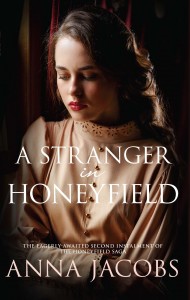
1916 Bella is working as a Voluntary Aide (VAD) driving ambulances in England, when she meets and marries Philip. His family strongly disapprove but the two of them are happy together. When the worst happens, Bella must face their hostility alone. After someone tries to kill her, she takes refuge in Honeyfield with the help of Philip’s best friend Tez, who has been injured in France. But she is still in danger and there is a new problem to face. How can she build a more peaceful new life?
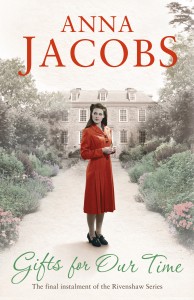 Gifts For Our Time – #4 and final in the Rivenshaw series:
Gifts For Our Time – #4 and final in the Rivenshaw series:
Germany 1939, and Christa Sommer boards the Kindertransport, unsure that she’ll ever see her beloved mother and father again. Once in England she is taken in by elderly Mrs Pelling, who grows to love Christa as the daughter she never had.
But in 1945 Mrs Pelling dies. While her will cannot be found, her money-grabbing niece appears out of the blue to claim her inheritance and turfs Christa out, with only a suitcase to her name. The prejudice against Germans still runs high in England, and Christa is unable to secure a job or a place to stay…
Luck comes her way when a lady she saves from being mugged turns out to be Mayne Esher’s friend Daniel’s mother. Taking pity on Christa, they take her to Rivenshaw where they plan to start a new life as part of the Esher building firm.
But Esherwood is not a trouble-free sanctuary. Determined to do his bit for soldiers returning from the war Mayne Esher has agreed to sell the council land at the rear to build prefabs on. But an empire-building town planner seems set on taking all of Mayne’s land for the war effort…
Mayne has also discovered a secret door at the back of the old Nissen hut, with a complicated locking mechanism called a puzzle lock that has local locksmiths dumbfounded. Just what is hidden behind the door to warrant such high security?
Historical fiction fans might be interested to attend the 2017 Melbourne Historical Novel Society Australasia conference on 8-10 September. The programme features over 60 speakers. You can read interviews with some of the participating authors at the HNSA blog.
Writer, avid reader, keen reviewer, book collector, drinker of all tea blends originating from Earl Grey, and modern history enthusiast. I enjoy reading many genres but have a particular interest in historical fiction. You can find me and all of my book related news and reviews at: Theresa Smith Writes, Facebook, Goodreads and
Twitter @TessSmithWrites.

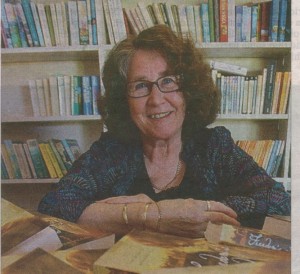

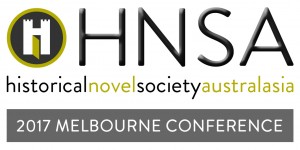
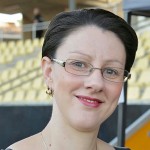




Ah, another ‘Anne of Green Gables’ fan. There’s certainly a few of us!
I’m noting through these Spotlights that Anne has quite a following!
Theresa, I have some lovely readers, that’s for sure. I love giving them pleasure. I get so much pleasure myself from reading other authors’ books.
Enjoyed reading this interview with AnnaJacobs , she’s my favourite author , I’ve had the pleasure of meeting her and her husband in my home town a few years ago. I can say Anne of Green Gables is a favourite of mine .
I have read heaps of Anna’s stories, and they are perfect for a relaxing, absorbing escape from the daily round. A tribute to such industry covering history and science fiction as well as satisfying modern family novels.
I love Anna Jacobs I only discovered her a few years ago the best books I love is thr Traders series and I wish she would write another and the pennyworth of sunshine